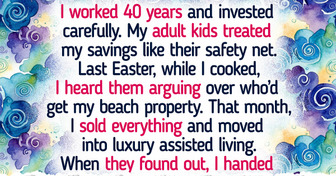Stop feeling guilty. That’s how this situation lasted 4 months. He ought to thank you for the reality check, and a paycheck. This crap about a reset is stupid. People keep jobs so they can eat. Time the 24 year old learned that.
I Let My Adult Son Move Back In and Became His Maid—So I Turned the Tables
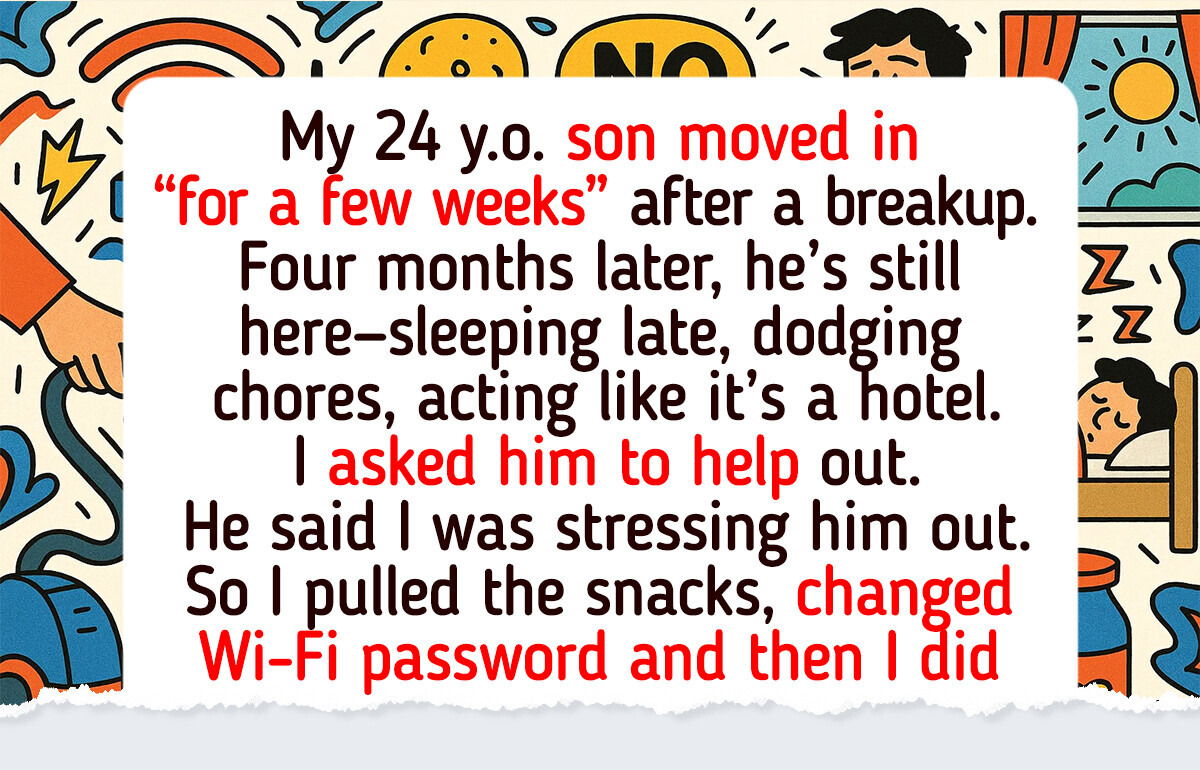
We recently received a story from one of our readers that made us laugh, sigh, and nod all at once. It’s about parenting an adult child who overstayed his welcome—and the wildly creative solution this mom came up with.
Was it petty? Maybe. Was it effective? You decide.
The story with her own words.
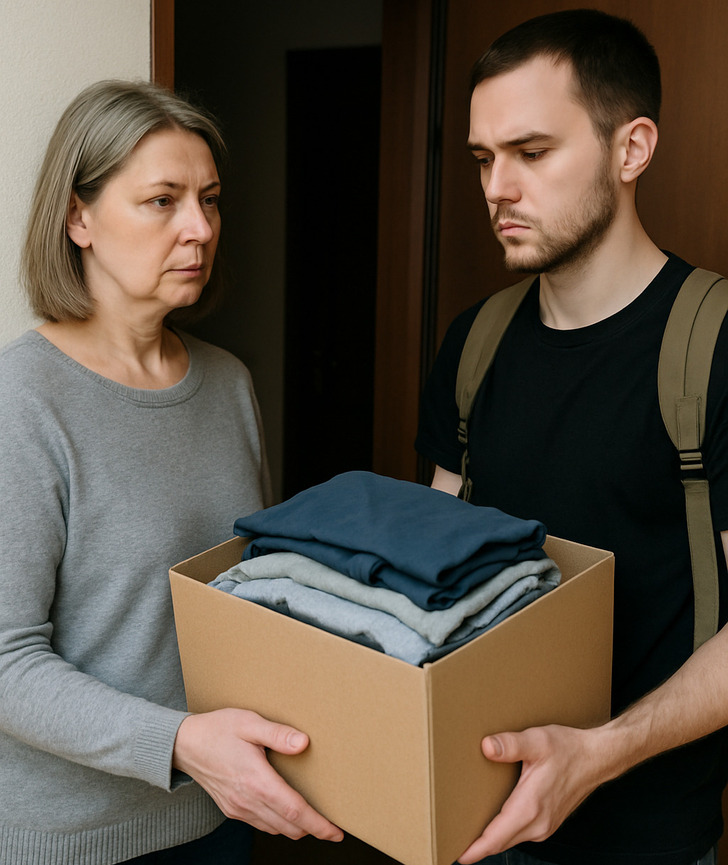
“So my 24-year-old son moved back in after a breakup. ‘Just for a few weeks,’ he said.
Four months later, he’s still here. No job. No rent. No effort.
He sleeps until noon, leaves dishes near the sink (never in it), and treats the living room like his personal locker room.
Meanwhile, I work full-time and somehow still ended up doing his laundry last week. Out of habit. Like some kind of brainwashed hotel maid.
When I tried to talk to him about pitching in, he hit me with, ‘You’re stressing me out. I need space to reset.’
Dude. You’re eating my groceries and using my Netflix. What space?
So I stopped buying his favorite snacks. I paused his profiles on streaming. Changed the Wi-Fi password. He got annoyed but stayed.
Then I did something... petty. Maybe extreme.
I listed his bedroom on Airbnb.
Yep. Took nice pics while he was out. Wrote a cute little description: ‘Cozy room in a quiet home. Shared bathroom. No overnight guests.’
Got booked within three days.
Told him: ‘You’ve got two weeks. The room’s rented. You’ll need to be out.’
He was furious. Said I was choosing strangers over my own kid.
I said, ‘No, I’m choosing boundaries over freeloading.’
He moved out a week later. Crashed with a friend. Got a part-time job two weeks after that. Now he’s figuring it out.
We’re talking again. Civil. Maybe better than before.
Do I feel guilty? A little.
Would I do it again? In a heartbeat.”
Helping Adult Children: When Support Helps—And When It Hurts

Parenting doesn’t stop when your kids grow up. But knowing when to step in—and when to step back is key to helping them thrive, not stall.
Here’s what family experts suggest:
🔹 Support Life Crises, Not Lifestyle Habits
There’s a big difference between helping through a layoff, illness, or sudden hardship—and constantly covering for poor decisions like overspending, missed rent, or skipped responsibilities. Let natural consequences teach the lesson.
🔹 Financial Help = Financial Say
If you’re paying their bills, you get a say. If not, advice should come only when asked—or when the stakes are serious. Don’t give both money and uninvited direction. Choose one.
🔹 Before Giving Money, Ask Yourself:
Can I truly afford it?
Will this fix the problem—or enable it?
Is this a crisis or a chronic habit?
Will it teach responsibility—or erase it?
Could I offer help in another form (childcare, groceries, job leads)?
Is this becoming a pattern?
🔹 Set Clear Terms
If you do give money, clarify:
Is this a gift or a loan?
When will it be paid back?
Is this the last time—or the start of something unsustainable?
🔹 Think Long-Term
Help should lead to greater independence, not deeper dependence. Education, job training, or launching a business? Possibly worth it. Funding vacations, shopping, or unpaid bills from avoidable choices? Probably not.
Saying “no” doesn’t mean you don’t care. It means you’re teaching them how to care for themselves.
I Removed My Son From My Will—I Won’t Tolerate Humiliation I Don’t Deserve
Comments
You did good, and your son might change for the better. Maybe he will hate you for few years, but it's for his better future. I can't really suggest what should be done if he still view your act with hateness tough.
Finally someone who figured out that handouts and doing everything for a kid do not teach them to be a good and independent person.
Related Reads
My DIL Expected Me to Be Her Free Maid in Retirement, but I’m One Step Ahead
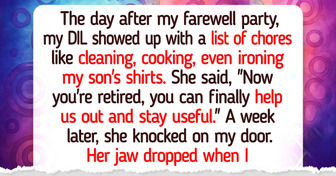
My Boyfriend Forces Me to Have Kids, but I Refuse to Give Up My Childfree Life
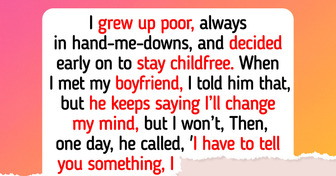
20 People Who Proved That the Kindest Hearts Wear the Strongest Armor
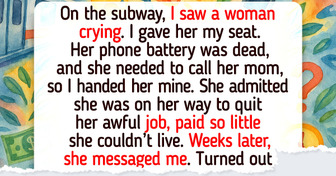
I Refuse to Let My Stepdaughter Return Home After She Violated My Trust
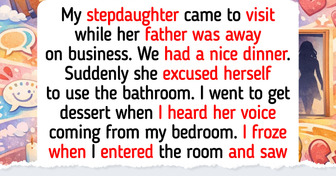
I Refuse to Host My Sister—I Don’t Care If She’s Homeless With 3 Kids
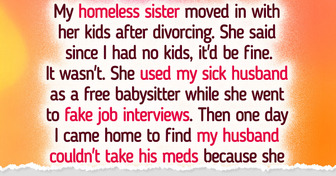
14 Stories That Show the Raw Reality of Kids Caring for Their Aging Parents

I Refused to Pay for Our Valentine’s Dinner—Then I Learned the Heartbreaking Truth

10 Moments That Prove Kindness Is the Force That Keeps Us Going
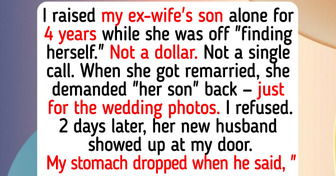
10 Stepdads Who Proved Kindness Creates Real Fathers

12 Success Stories That Remind Us Office Kindness Is a Quiet Strength We Often Forget
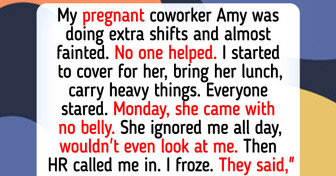
I Refuse to Spend My College Fund on My Stepsister’s Wedding, She’s Not Even My Real Sister
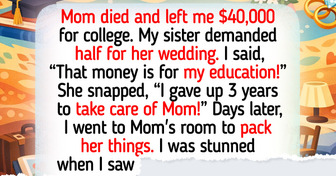
I Refuse to Leave an Inheritance to Children Who Treated Me Like a Cash Cow—So I Made One Final Decision
